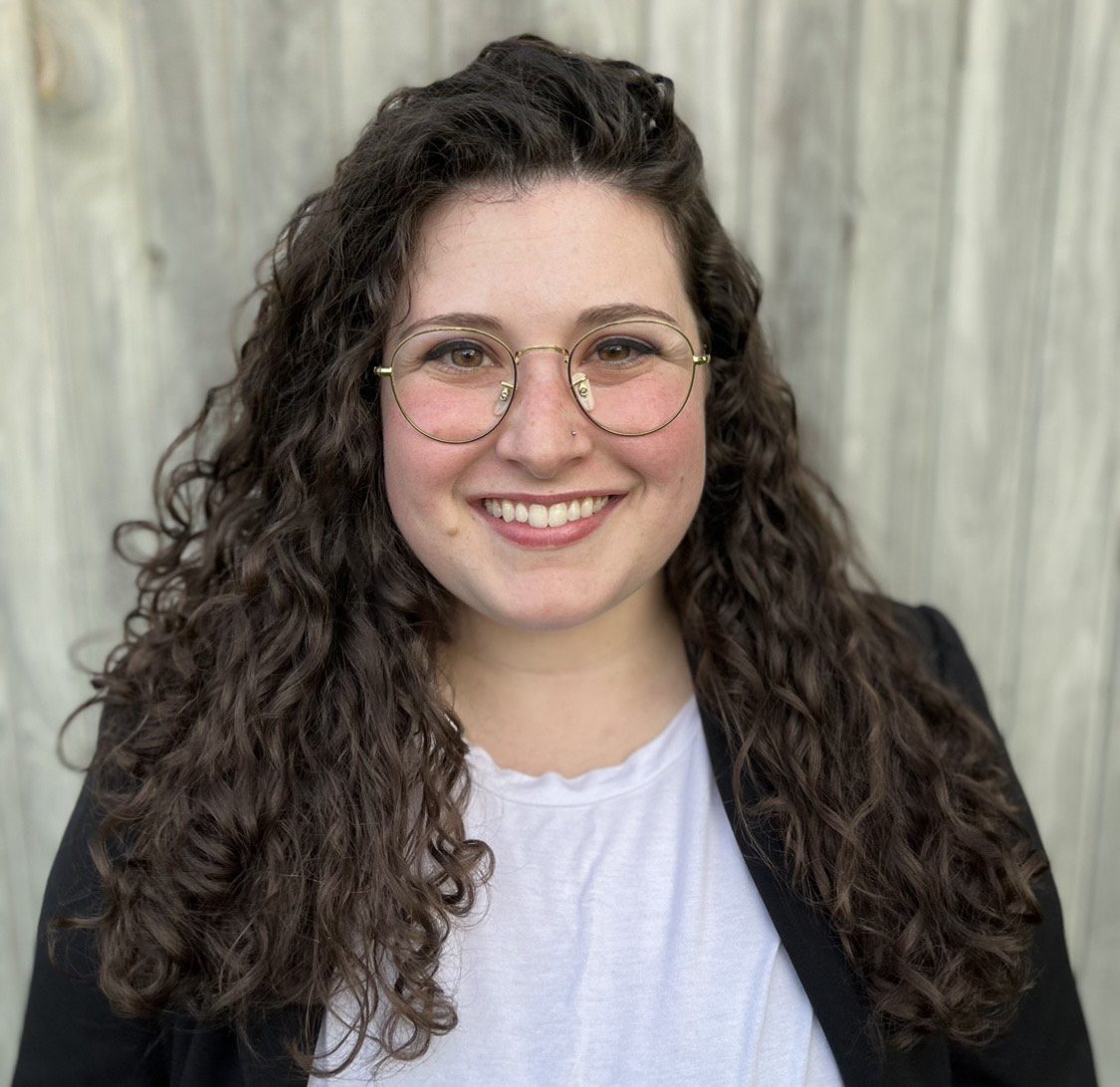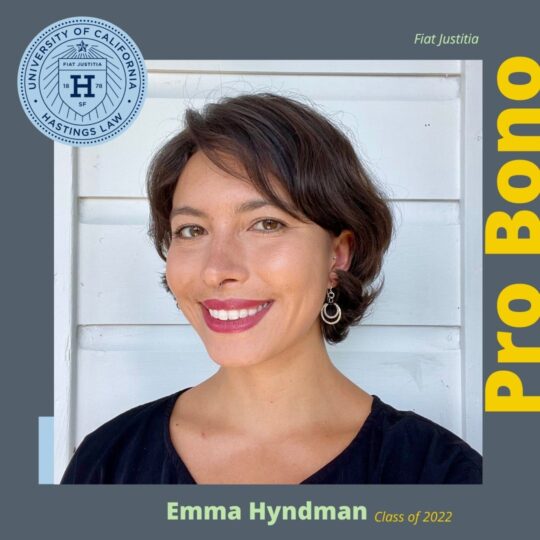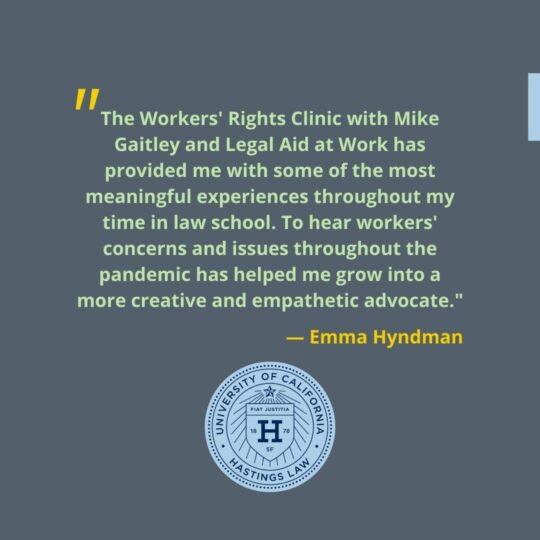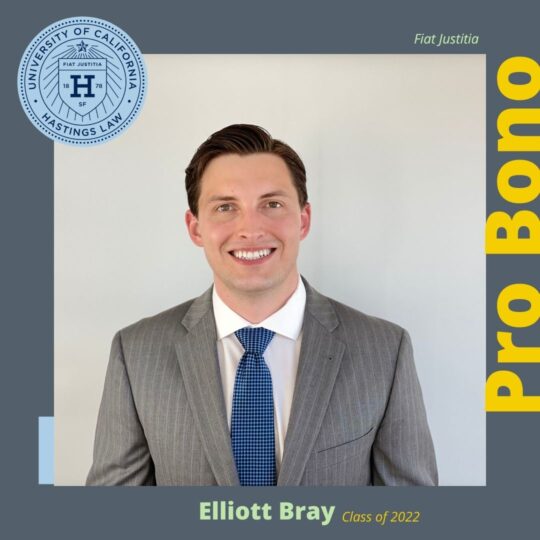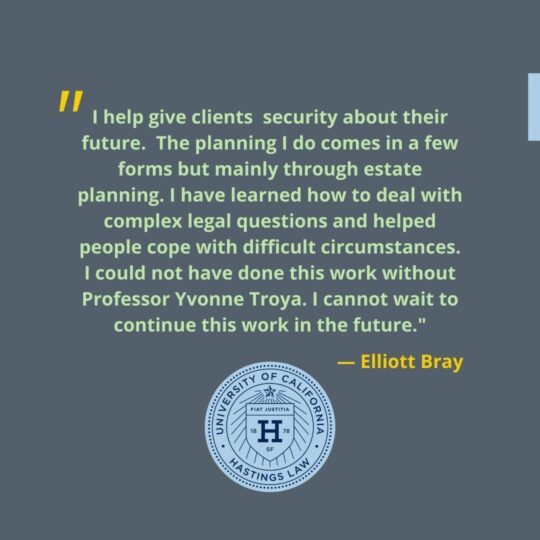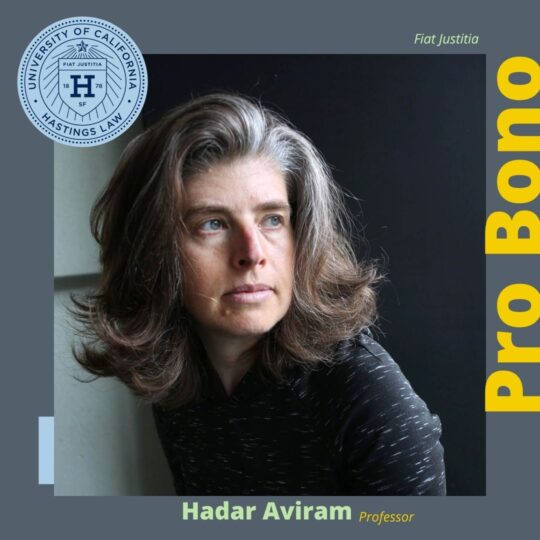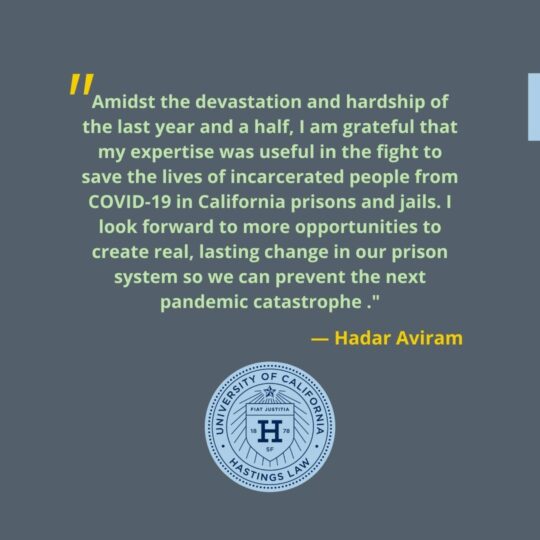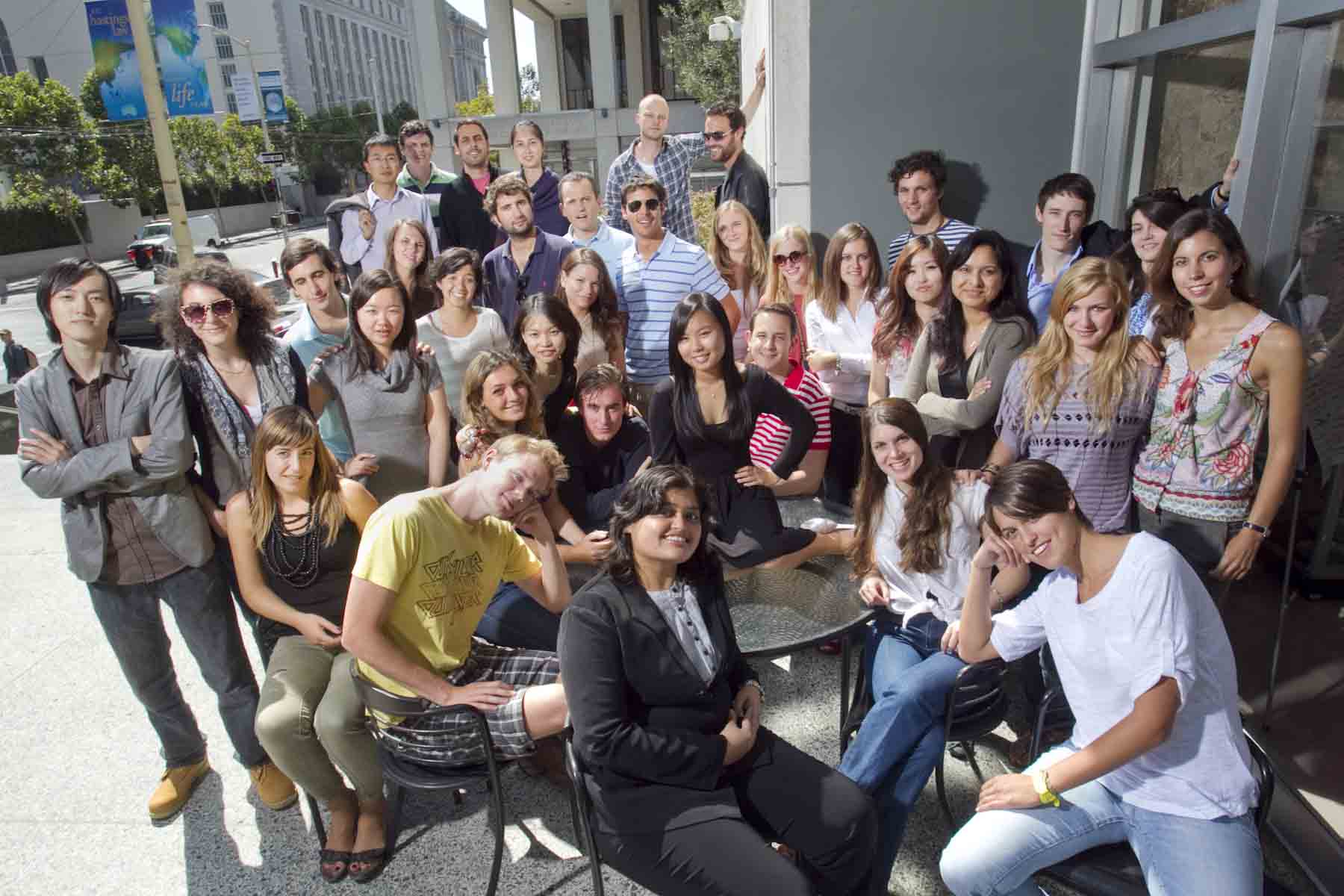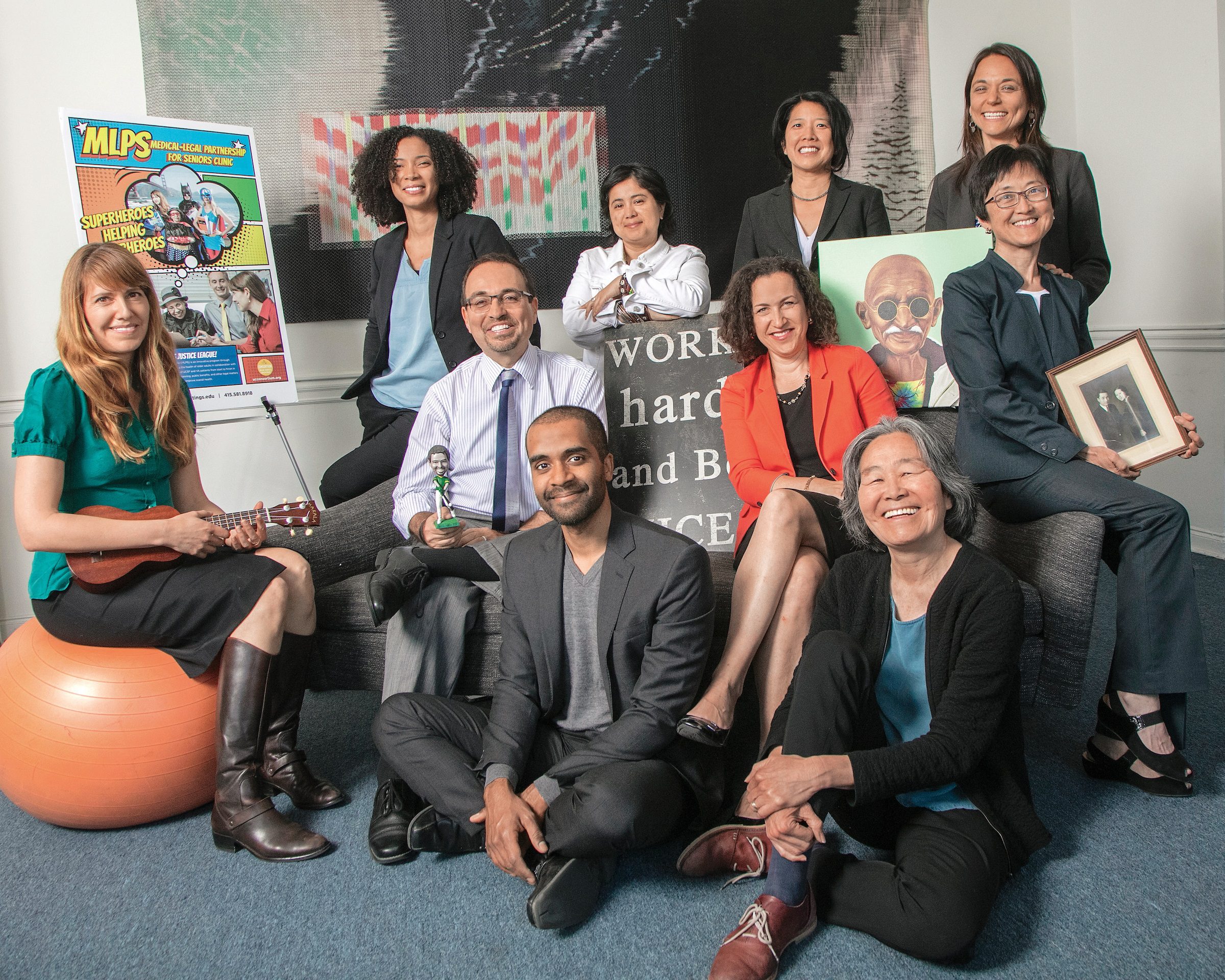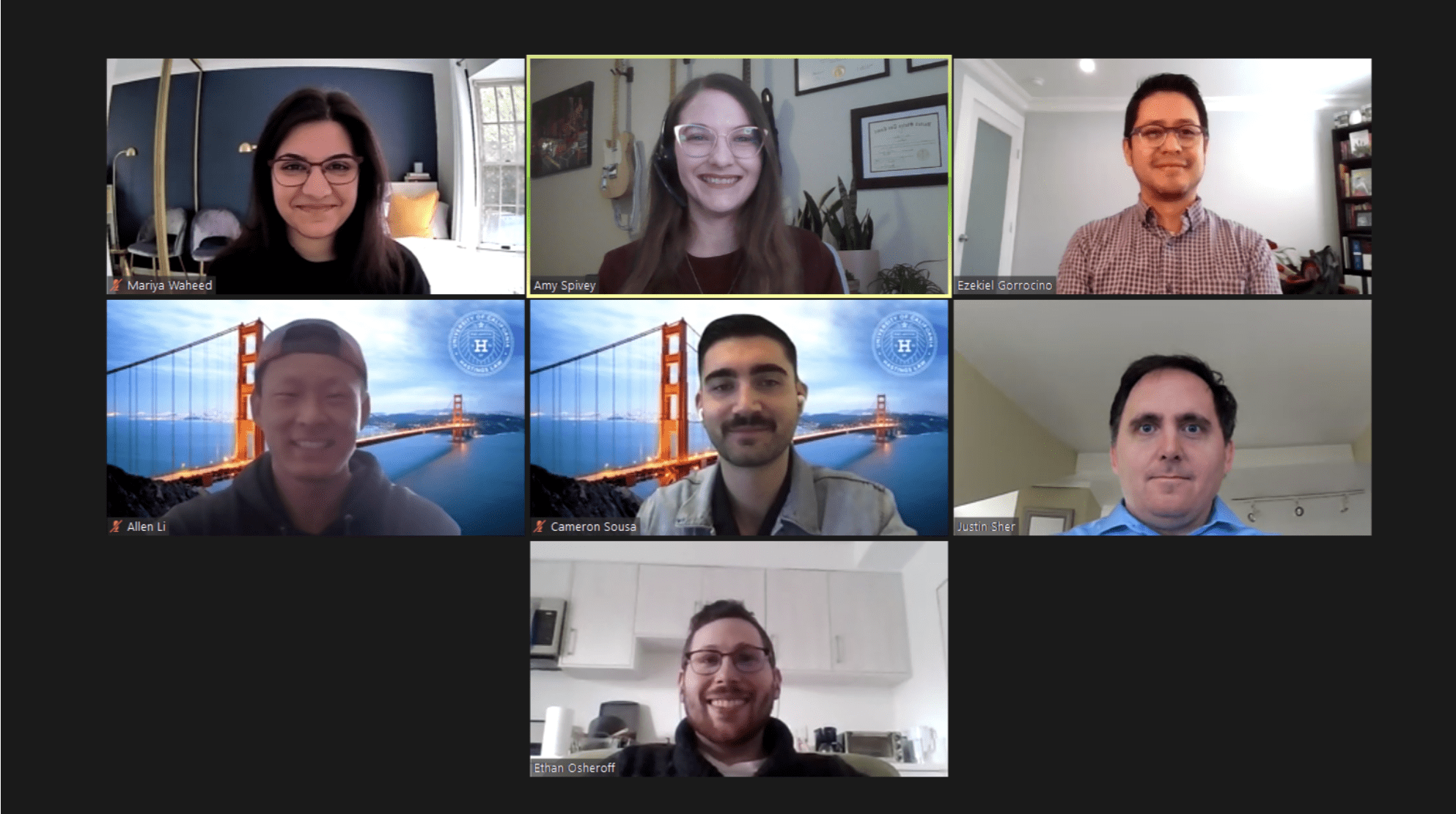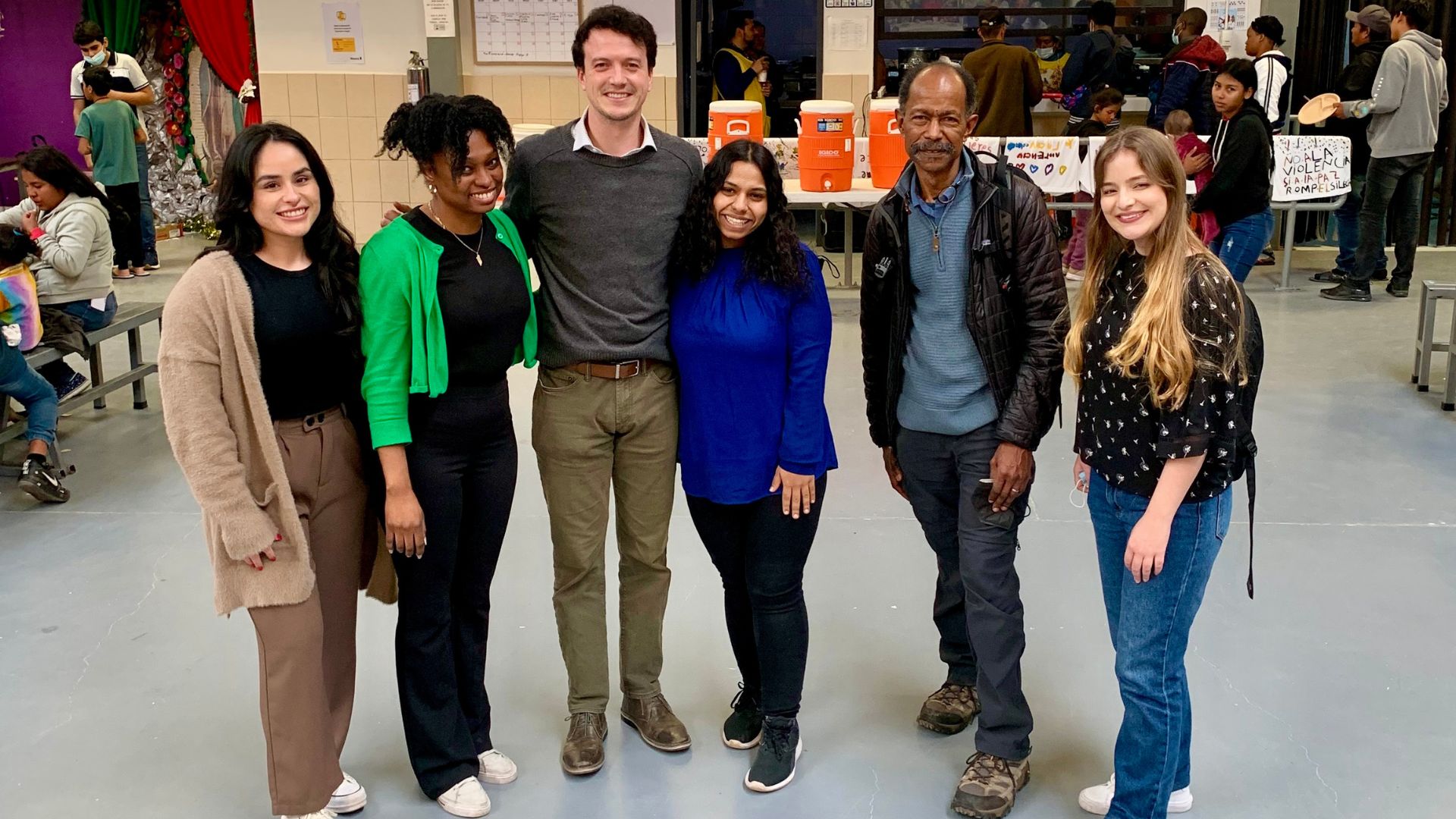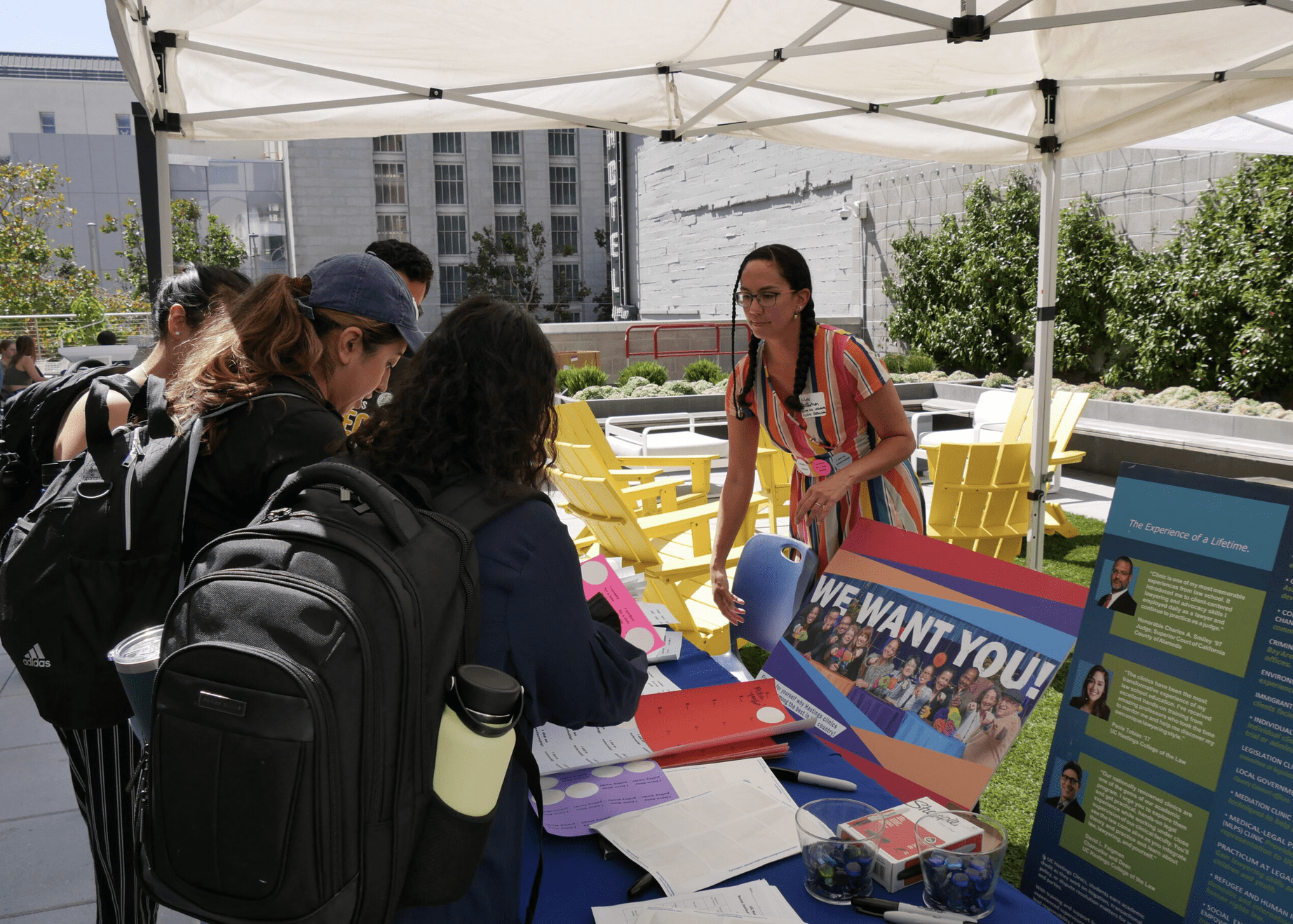
Pro Bono
For the Public Good
UC Law SF’s Pro Bono Program offers students opportunities to meaningfully engage with clients and bring essential legal services to underserved communities. Students who choose to participate gain practical skills, and make sincere connections with non-profits and lawyers. UC Law SF’s unique location in central San Francisco allows students to work with our neighbors on a range of issues, including fighting evictions, seeking asylum, challenging sentences of death, and set up socially-focused businesses.
Students have the opportunity to sign the Pro Bono Pledge, where students make a personal commitment to provide 45 hours of pro bono hours prior to graduation. This Pledge honors the California Bar and ABA’s encouragement for all attorneys to devote time annually to pro bono service to ensure the promise of “justice for all” is a reality.
Pro Bono Staff
Learn More
The provision of pro bono legal services is an integral component of a legal education and to the practice of law. UC Law SF encourages and fosters pro bono participation by all members of our community in an effort to improve access to justice for all.
JD Students can pledge to provide 45 hours of pro bono work over the course of their three years at UC Law SF by signing the Pro Bono Pledge. Those students who meet their pledge goals by graduation will be inducted into the Pro Bono Society and recognized in the graduation program. This achievement will also be noted on the student’s transcript.
Those students who go above and beyond, and accrue 150 hours of pro bono service are awarded the Outstanding Achievement in Pro Bono, and recognized for this significant accomplishment.
LLM/MSL and JD Transfer students can also pledge with numbers that reflect their time at Hastings (15 hours for each year at Hastings).
For purposes of graduation recognition, UC Law SF defines pro bono as volunteer work in law-related services provided directly to or on behalf of under-represented individuals or communities.
Students can accrue hours that fall into three categories:
Pro Bono – The heart of pro bono service is to lessen the justice gap and provide meaningful access to those who lack it. Thus, “pro bono” hours are those where students are providing direct services to or on behalf of under-served by our justice system.
Public Interest – (these, in combination with Community Service hours, can count for a maximum of 50% of pledge hours). These hours include any law-related work in the public sector which do not meet the above definition of pro bono. Public service encompasses work that is in the public interest, and is law-related, but where it is not expanding knowledge or access for underrepresented communities. This category include work in judicial chambers and most governmental offices. If you are working in one of these offices, and doing work that expands legal access (for example file reviews for resentencing at a DA office), please consult with our office as that may meet the pro bono definition.
Community Service – (these can count for a maximum of 25% of pledge hours). Hastings encourages students to be involved in a variety of ways in the local community. Thus, some hours can be accrued for any non-law related service work, including mentoring or tutoring students, service at local food kitchens, and other community involvement.
The Pro Bono program at UC Law SF uses an online tracking and submission system – Track It Forward. You can sign in, register, and log hours by clicking here. Instructions for timesheet submission can be found on Sharknet.
JD students who perform a minimum of 45 hours of volunteer services to under-represented individuals or communities during their tenure with UC Law SF will be inducted in the Pro Bono Society and recognized for their achievement at graduation. Those who complete at least 150 hours will receive recognition for Outstanding Achievement in Pro Bono. Hours requirements are pro rated for other programs/circumstances: transfer, LLM, MSL, & Foreign Exchange students are required to complete 15 or 50 hours for each year spent at UC Law SF.
Students are encouraged to create an account with Track It Forward to get the latest notifications about opportunities. They are also encouraged to regularly check Sharknet to get more information on available opportunities. The site is regularly updated as opportunities arise. If you have any questions, you may also email our team at probono@uclawsf.edu.
Private law firms have the resources and power to help close the justice gap. Most firms recognize the responsibility of attorneys as legal practitioners to do good and provide life-changing assistance to the most pressing communities. In addition to making an impact, pro bono opportunities allow first-year associates to take an active role in cases, build leadership skills, and gain hands-on experience. If you decide to enter private practice, we hope that you choose a firm with demonstrated commitment to pro bono and that this engagement becomes part of your practice.
As future attorneys, you have the power to influence the direction of the legal profession and the weight it gives to pro bono. Making pro bono a priority and a strong part of your values is something law firms can take a note of after you have a firm offer. Competition amongst prospective associates can be fierce and learning about a firm’s pro bono culture can help steer a candidate to a firm. Asking questions and showing a genuine interest in a firm’s pro bono program allows law firms to recognize the value incoming associates have for it.
Below are some tips from the American Bar Association on how to constructively evaluate law firm pro bono programs. Best of luck on your job search and thank you for making pro bono an essential part of your journey as a lawyer!
ABA Recommendations for Law Firm Pro Bono Programs
The American Bar Association recommends that firms adopt written policies and practices that support and reward pro bono work, including policies and practices that:
- Count pro bono hours as billable hours.
- Consider attorneys’ commitment to pro bono activity as a favorable factor in advancement and compensation decisions.
- Set annual goals regarding the number of hours contributed through firm pro bono programs and the number of attorneys who participate.
- Establish and maintain systems that ensure that firm pro bono programs are managed effectively, that participating attorneys receive training and guidance, and that the highest levels of firm management oversee and participate in their programs.
- Provide opportunities to participate in pro bono through sabbatical and part-time pro bono programs, fellowships, or rotation programs.
ABA Sample Questions to Evaluate a Law Firm’s Commitment to Pro Bono
- If the firm has a billable hours target, does pro bono work count towards billable hours? Does the firm have a maximum number of pro bono hours which may be applied toward the billable requirement?
- How does pro bono factor into compensation, performance reviews and partnership decisions?
- Does the firm have a written pro bono policy?
- If the firm has adopted a pro bono policy, has the firm made any recent changes to its policy? If so, why?
- Does the firm have a structured pro bono program? For example, does it have a pro bono committee?
- Does the firm have a pro bono coordinator? Is this person an attorney? Is this person a partner? Does this person work full or part time on pro bono matters?
- What percentage of the lawyers in the firm did pro bono work last year? What percentage of the partners? What percentage of the lawyers who made partner this year handled a pro bono case?
- What other resources does the firm make available to attorneys who perform pro bono work? For instance, is training available? Is support staff permitted to work on pro bono cases?
- How does the firm define pro bono work?
- Do partners supervise pro bono work?
- How does the firm decide which pro bono cases the firm will accept? If an attorney brings a pro bono case for possible consideration by the firm, who makes decisions about whether the organization will handle the matter?
- Does the firm have a signature pro bono project or focus on a particular issue?
- How is pro bono work assigned or distributed?
- Does the firm encourage or require attorneys to perform a minimum number of hours of pro bono work?
- In addition to a pro bono policy, does the firm have other programs encouraging public service — e.g., summer rotation, split summers or post-graduate fellowships?
The New York State Court of Appeals requires applicants for admission to the New York State bar to perform 50 hours of pro bono services. Please consult the New York State Board of Law Examiners website for more information, as the definition of pro bono and requirements are different than those for graduation recognition at UC Law SF. If you are using work done at UC Law SF to fulfill this requirement, we recommend that you obtain the necessary affidavit as you complete your work with a particular organization or project. Generally, you will have your supervising attorney sign these forms. For Hastings-sponsored programs (such as LARC or VITA), please email the Pro Bono Team at probono@uclawsf.edu.
We welcome opportunities to partner with public interest and pro bono providers whether you are an organization or attorney seeking law students to assist with a pro bono project! If you are interested in partnering up with UC Law SF law students, please email the following information (or as much as you have) to probono@uclawsf.edu, and if possible, include the following information:
- Introduction of organization and the work you do
- Detailed description of the tasks students would be doing
- In-person or remote volunteer opportunity
- Time Commitment, i.e., hours per week, month, total hours for the academic semester, etc.
Awards and Pro Bono Spotlights
Want to Support Our Students?
One important way to support our students and our community clients is by donating to the Pro Bono Program. Funds are used to directly support student engagements in the community. For example, funds can provide sufficient money for gas or hotel rooms for students providing services to those located in rural areas of the state, or for travel throughout the country on Alternative Spring Break programs.
Please consider donating to the Pro Bono Department generally, or if you or your firm would like to sponsor an Alternative Spring Break trip, please reach out to the Pro Bono Department Director, Brittany Glidden. In past years we have had Spring Break trips where students: assist refugees seeking asylum in preparing for credible fear interviews; engage in investigation discriminatory practices in rural housing; and help immigrants obtain naturalization papers. Student demand for these opportunities is high and it helps our students develop important lawyering skills while making a meaningful difference in the community. Consider being part of funding a trip!
The Numbers
Figures from the past five graduating classes alone
400+
Graduates with Pro Bono Distinction
45K
Hours of Pro Bono Service to the Greater Community
140+
Graduates with Outstanding Achievement in Pro Bono Distinction
Seeking Legal Help?
| VITA-Volunteer Income Tax Assistance Program |
LARC-Legal Advice and Referral Clinic |
 |
 |
| For more than a decade UC Law SF law students have partnered with the IRS and the United Way to offer free tax preparation and filing services to low-income community members. | Do you need a confidential consultation with an attorney but cannot afford it? The Justice and Diversity Center’s Legal Advice and Referral Clinic (LARC) provides three free legal clinics every month for low-income Bay Area residents. The clinics offer free, limited legal advice and referrals. |
